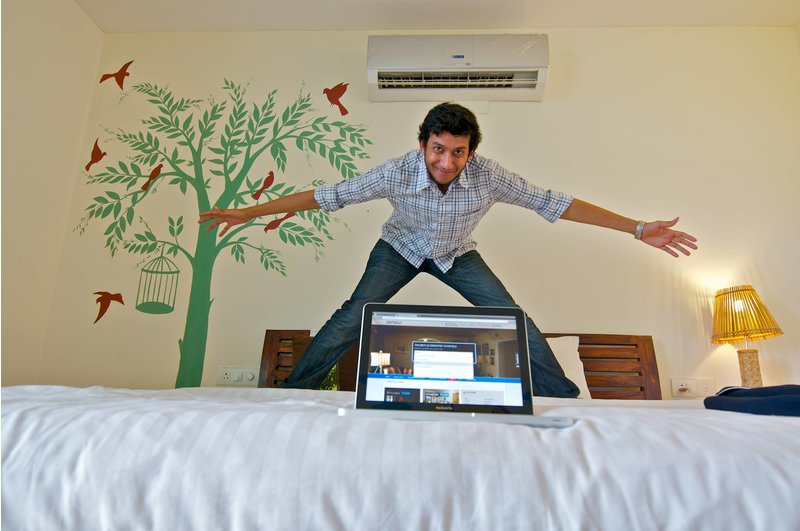19岁创业办酒店,5年后公司估值达到50亿美元,这位90后是如何做到的?

|
想在印度找到便宜干净的酒店,简直就是旅行者的噩梦。情况往往是,在网上看起来还不错的酒店实际上位于一栋摇摇欲坠的楼里,蟑螂肆虐,浴室用水还得用桶从外面提进去。 睿泰什·阿伽沃的解决方案是提供一个订房终端,承诺如实宣传、提供品牌酒店供顾客选择,绝不会给你“惊喜”。他于2013年成立的Oyo酒店已经成为印度最大的酒店连锁,根据新德里调研公司Hotelivate的数据,印度混乱的酒店业市场价值45亿美元。 目前,阿伽沃正在进军海外市场,向想要加盟的小酒店业主开放他们的特许经营模式,提供预定网站和一整套服务。Oyo公司于9月底宣布,正在向软银、红杉和其它投资者融资,希望筹得10亿美元用于向包括中国在内的其它国家扩张,Oyo已于去年11月进入中国。Oyo在英国的生意在近期刚刚开张,这是公司业务首次进入发达国家市场。 “2023年,我们将成为世界上最大的连锁酒店。”Oyo这位24岁的创始人最近在公司总部新德里郊区的一家酒店接受采访时说。“我们想把世界各地零零散散的、没有品牌的产业变成优质旅居空间。” Oyo有数百名线下员工的职责是按照包括床垫床单质量和水温在内的200个指标对酒店进行评估。如果成功签约,酒店能在路边挂一个鲜红的“Oyo”招牌,就像是高品质的盖章认证;除此之外,大部分酒店老板需要同意由Oyo进行为期一个月左右的翻新。此后,Oyo从每笔酒店订单中抽取25%。房间定价一般为25美元和85美元之间。 “Oyo正倾尽全力,打造友善亲切的品牌形象,致力为酒店业主提供超大型基地和平台。”RedSeer管理咨询公司的分析员穆里甘克·古特古迪亚说。“Oyo软件的订房模式很成功,因为价格敏感型游客会根据地址搜索酒店,而且希望自己有很多选择。” 阿伽沃不愿透露销售额,但他表示成交量去年增长了三倍,其中90%来自回头客——公司没花一分钱做广告。他说,现在Oyo覆盖160个印度城市,有1万家酒店,逾12.5万间客房。据RedSeer估算,这差不多占印度全部酒店客房数的5%。 “每晚都有超过15万旅客睡在我们酒店的床上。”阿伽沃说,他体型精干,一边说话一边扯一只生疼的耳朵。长期航行导致的耳朵疼可以说是公司飞速增长产生的一点不愉快的副作用。 脏床单 不是所有人都对自己在Oyo酒店的住宿经历感到满意。最近有位客人帕耶尔·古普塔就对新德里机场旁的一家酒店很不满意,她觉得那房子在匆忙间被草草改成了酒店。床单是脏的,浴室十分促狭。“仅仅有Oyo品牌的洗发水和润肤露可不行。”她说。 RedSeer分析师古特古迪亚称Oyo需要稳定的资金流,还需要一支线下团队维持酒店质量。“如何保障高质量的用户体验是个大难题。”他说。 根据调研公司CB Insights的数据,印度的创业企业最近势头迅猛,其中十几家价值都超过10亿美元。今年8月,沃尔玛以160亿美元的价格购入2007年成立的在线零售商弗利普卡特(Flipkart)的大部分股份。 据匿名知情人士透露,Oyo近期宣布的融资使公司估值达到50亿美元。也就是说,是印度估值第二高的创业公司,屈居于One97 Communications之后,后者拥有电子支付公司Paytm,获得了沃伦·巴菲特的伯克希尔-哈撒韦公司提供的资金支持。 在一个名校情结极为严重的国家,大学肄业生阿伽沃却出人意料地成为商界之星,频繁出席电视颁奖典礼,还登上了去年《福布斯》杂志印度版的封面。 阿伽沃说,他第一次住酒店是12岁,当时他被选中代表学校去离家几个小时的一个镇上参加知识竞赛。几年后,他周游印度,因为预算紧张不得不寄宿在一些环境极度恶劣的小旅馆里,因而产生了成立Oyo的想法。他意识到仅仅通过网站把不同酒店集中起来是不够的,还要对酒店进行修缮翻新。为了从零开始学习酒店业务,他花了一年时间在其中一家酒店打扫房间。 2013年,他从彼得·泰尔那里得到了一笔10万美元的资助,彼得·泰尔是Paypal的联合创始人,出钱资助辍学创业的学生。重大转机出现在2015年,包括硅谷红杉资本和日本软银集团在内的投资者向他提供了一亿美元的风投。 去年11月,阿伽沃将生意拓展至中国,一开始只在工业城市深圳签了一家酒店。不到一年的时间里,这个世界第一人口大国的旅行者已经可以在中国超过170个城市1000家Oyo酒店的87000间客房中进行选择。 对于阿伽沃而言,还有个小问题。他说母亲一直念叨让他暂时离开手头的生意,回去上学。“为什么要让大学干涉我的教育呢?”他笑着说。(财富中文网) 译者:Agatha |
Finding clean, affordable hotels in India can be a traveler’s nightmare. Too often, what looks good on a website turns out to be a roach-infested room in a crumbling building where water has to be schlepped to the bathroom in a bucket. Ritesh Agarwal’s solution is a booking app that promises truth in advertising and branded hotels that don’t deliver unpleasant surprises. The chain he started in 2013, Oyo Hotels, has already become the largest in India, a chaotic market worth $4.5 billion, according to New Delhi-based researcher Hotelivate. Now Agarwal is going overseas with his franchise model, which combines a reservation site with a full stack of services for small hoteliers who want to up their game. At the end of September, the company said it’s raising $1 billion from SoftBank Vision Fund, Sequoia Capital and other investors to fund expansion in countries including China, where Oyo opened in November. It started service in the U.K. recently, bringing the business to a developed market for the first time. “By 2023, we will be the world’s largest hotel chain,” the 24-year-old founder said in a recent interview at an Oyo hotel in a suburb of New Delhi, where the company is based. “We want to convert broken, unbranded assets around the globe into better-quality living spaces.” Oyo employs hundreds of staffers in the field who evaluate properties on 200 factors, from the quality of mattresses and linens to water temperature. To get a listing, along with a bright red Oyo sign to hang street-side like a seal of good-housekeeping approval, most hoteliers must agree to a makeover that typically takes about a month. Oyo then gets 25 percent of every booking. Rooms usually run between $25 and $85. “Oyo is going all out to build a very large base of hotel partners and become a bona-fide brand,” said Mrigank Gutgutia, an analyst with RedSeer Management Consulting. “Their app model works well because price-conscious travelers who search by location like to feel they have lots of choices.” Agarwal wouldn’t give sales numbers, but he said the number of transactions has tripled in the last year, with 90 percent coming from repeat travelers — and no money spent on advertising. There are now 10,000 hotels in 160 Indian cities, with more than 125,000 rooms, listed on the site, he said. That’s about 5 percent of India’s total room inventory, according to RedSeer estimates. “Over 150,000 heads rest on our pillows every night,” said Agarwal, a trim man who tugs at a sore ear as he talks. Constant airplane travel has given him an ear ache–one unwanted side effect of the company’s hyper growth. Dirty sheets Not everyone is happy with the Oyo experience. Payal Gupta, a recent guest, was disappointed by her stay at a property near Delhi Airport, which she said felt like a house that had been hurriedly converted into a hotel. The sheets were dirty and the bathroom was cramped. “It isn’t enough to have Oyo-branded shampoo and moisturizer,” she said. Gutgutia, the RedSeer analyst, said the company will need a steady stream of capital and an army of people on the ground to maintain standards. “Sustaining a high-quality experience could be a real challenge,” he said. Indian startups have been on a tear recently, with more than a dozen worth now more than $1 billion, according to researcher CB Insights. Walmart paid $16 billion for a majority stake in Flipkart on August, an online retailer founded in 2007. The funding announced recently by Oyo values the business at $5 billion, according to a person familiar with the deal who asked not to be identified. That makes the startup India’s second most-valuable, after One97 Communications, owner of Paytm, a digital payments company with financial backing from Warren Buffett’s Berkshire Hathaway A college dropout in a country where university pedigree is obsessed over, Agarwal has become an unlikely business star, with frequent appearances on televised award shows and a cover story last year in Forbes India. Agarwal says he never stayed at a hotel until he was picked to represent his school at a trivia competition held in a town a few hours away from home when he was 12. He got the idea for Oyo a few years later, while traveling India on a shoestring budget and lodging at some truly horrible guest houses. It wasn’t enough to aggregate hotels on a website, you also had to repair them, he realized. To learn the hotel business from the ground up, he spent a year cleaning rooms at one of them. In 2013, he got a $100,000 fellowship from Peter Thiel, the PayPal co-founder who subsidizes students who drop out to start their own companies. The big break came in 2015, when he got $100 million in venture funding from investors including Silicon Valley’s Sequoia Capital and Japan’s SoftBank Group Corp. In November, Agarwal brought the business to China, starting with a single listing in the industrial city of Shenzen. Now, less than a year later, travelers in the world’s most populous country can choose from more than 1,000 Oyo-branded hotels and 87,000 rooms in over 170 Chinese cities. For Agarwal, though, there’s still a small hitch. He says his mother keeps nagging him to take a break from the business and go back to college. “But why let university interfere with my education?” he said with a laugh. |













